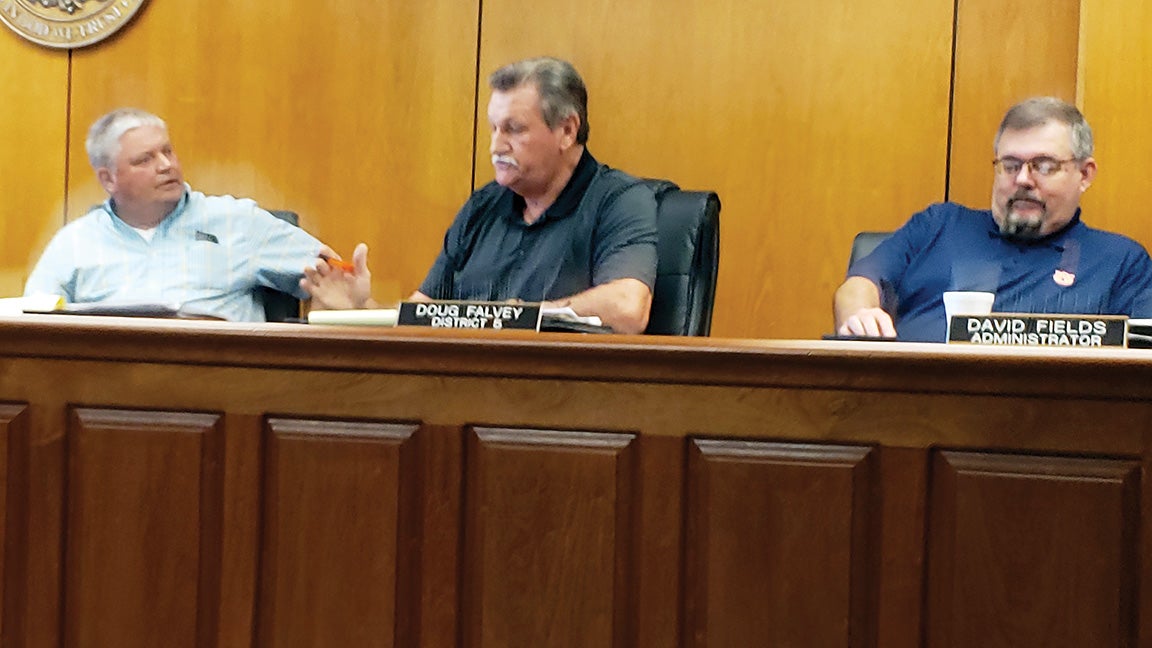Lincoln County supervisors argue over payroll issue
Published 10:11 pm Tuesday, September 3, 2019
A pair of Lincoln County supervisors Tuesday loudly argued over the responsibilities of the job before settling down to discuss warning signs to prevent another crash on a busy curve near the Lincoln Civic Center.
District 5 Supervisor Doug Falvey, before the board went into an executive session to discuss personnel, asked District 4 Supervisor Eddie Brown to update the board on an issue he brought up in mid-August concerning one of Falvey’s workers.
At the August payroll meeting, Brown questioned the legality of a worker’s employment and pay and asked the board to seek the advice of its attorney Bob Allen, who was not present at the meeting. Brown said then he wanted to know if it was legal for Falvey to hire his nephew, who he said had been on the job for over three years. Brown claimed the employee earned as much as workers in other supervisors’ crews who had more experience.
During Tuesday’s meeting, Falvey asked Brown to give a status report based on letters Allen mailed to the supervisors Aug. 19 regarding the “Nepotism/Ethics in Government Act.”
Allen said in the letter he looked into the situation “in which a grand or great nephew, by marriage, of a supervisor is working as a road hand or equipment operator to determine whether this violated the nepotism statue or the Ethics in Government Act.”
Allen cited a 1990 Attorney General’s opinion that said the position does not fall within the class of employment in the nepotism statute. He also spoke to the Ethics Commission’s staff counsel who said there was no violation of the statute for the Ethics in Government prohibition to apply, as it would have to be a relative defined as a spouse, child, parent or sibling.
“Simply stated, there is no law that prohibits the situation I was asked to look into,” Allen wrote.
“He (Allen) said it was OK. I don’t agree with it,” Brown said. “It’s always been said he’s your nephew.”
“I want you to get your facts straight,” Falvey said, turning to Brown who sits beside him at the raised desk in the boardroom.
“Tell us he’s not your nephew,” Brown said.
“He’s not my nephew, he’s no blood kin to me at all. First off, it’s District 5 and you have no dealings with District 5 at all,” Falvey said.
“Yes, I do. I’m elected as a countywide supervisor,” Brown said.
“Then why don’t you worry about the other county things we talked about,” Falvey said. “You brought it up, something that wasn’t even true, Eddie. It wasn’t even true. It wasn’t anything to it. And you brought up about how much he made.”
Falvey said when he came into office he was told there was not a pay scale for county employees and it was left up to the supervisors’ discretion for their workers.
“If that’s the county policy, I could have paid him $50 an hour and I’d have still been within the county policy,” he said. “It’s none of your business what I pay my employees and he’s not making more than other employee out there, he’s making as much.”
Brown disagreed.
“Anything that goes on in this county is my business,” he said.
Falvey accused Brown of a vendetta against only him as the two men continued to talk over each other.
“I’m not going to sit here and argue with you. That’s plum disrespectful to the whole board,” Brown said.
“No, it’s not disrespectful to the whole board. But I am tired of you getting your nose in my business when you don’t know what you’re talking about,” Falvey countered.
Falvey also accused Brown of approving payroll without questioning other employees’ pay. The board meets twice a month to approve payroll before checks are issued.
“But then you come up and pick up something that I’m doing that’s none of your business. You show me in the responsibilities of the supervisors that you have a right to question another supervisor of what he does. Show it to me,” he said.
President Jerry Wilson, who is District 1 supervisor, interrupted.
“We all should have a right to be able to say what’s what because it affects all of us, but I can say that I can feel that y’all picked on me, but I went on. I took it like a man and went on,” he said.
Falvey said he wanted it known that Allen’s inquiry showed he had not acted illegally by hiring the worker.
“The public thought that I was hiring my nephew and nobody would have never said anything else about it if I had not brought it up,” he said.
“Why couldn’t you say it wasn’t your nephew then,” Brown asked.
Wilson again called for the executive session, but before acting, District 4 resident Clyde Allgood, who was not on the agenda, asked if he could make a comment.
Allgood said he doesn’t think taxpayers are “getting a fair shake” because he doesn’t believe there is an order to the meetings.
“I just see this sort of thing,” he said, referring to the public disagreement between Brown and Falvey. “Eddie’s my supervisor. Doug’s my good friend. I know most of you.”
Allgood said Robert’s Rules of Order is not being followed and he told Wilson he couldn’t make motions as president, only call for them.
Allen said state statute allows Wilson to make motions, but Allgood doesn’t agree.
“I have been there and done this. But y’all go ahead. It’s very unprofessional,” he said.
He then asked about anticipated increases in taxes and the lack of paving on his road before the board finally closed the meeting for an executive session on personnel.
No action was taken when they reopened the meeting, but tempers seemed to have cooled a bit and they were able to discuss safety measures for the dangerous curve.
Plans discussed for curve
County engineer Ryan Holmes said two crashes in less than a month have damaged the fence in front of the Lincoln Civic Center’s arena.
Since the road is being resealed, he’d like to add rumble strips about 500 feet in each direction to give motorists a warning, especially at night, that there is an upcoming curve.
Rumble strips cause a tactile vibration and audible rumbling transmitted through the wheels and into the vehicle interior.
He also suggested the use of warning signs illuminated with flashing lights.
District 3 Supervisor Nolan Williamson wants to see more chevron signs — those yellow signs with a directional arrow that warns drivers of an upcoming curve.
Holmes said those get knocked down often.
“Well, try again,” Williamson said.
Falvey suggested a guardrail on the outer edge of the curve to protect the fence, but Holmes said motorists would likely hit the guardrail instead and repairs to those are expensive. He also said that if a vehicle was traveling too fast, the guardrail could cause the vehicle to ramp and go airborne.
Brown agreed with Holmes that the blinking signs would be the best route to take along with rumble strips.
“Space them out so they don’t jar you too bad but let them know there’s a curve ahead. When you start putting them real close together that’s when they start jarring your car real bad real bad,” Holmes said. “There’s a lot of residents out there so you wouldn’t want to put too many of those. They’re pretty loud. I think warning ahead of time would be a cost-efficient way to handle it and if that doesn’t work we can maybe take more extreme measures.”
No action on any of the options was taken.







